America
THE CRY OF the church to the world should be “Forgive us.”
At a time when the American church struggles with finding its place in the world and struggles with asserting its identity, could the church be known as the community that models confession, repentance, and the seeking of forgiveness? At this moment in history, the American church is often ridiculed or portrayed as unforgiving and ungracious. Could the church offer a counter-narrative, not of defensiveness or derision but of an authentic confession and genuine reconciliation? By examining seven different areas where the church has committed sin, we ask the church to consider the spiritual power and the theological integrity of a church that seeks forgiveness for those sins.
Our scriptures testify to the necessity of confession. Confession is central to the Christian faith. The importance of confession arises from the Christian view of sin. Sin is a reality and must be taken seriously. Evangelicals consistently begin our gospel presentation with the centrality of sin to the human experience. American evangelicals often assert that the beginning of the work of God’s forgiveness is the recognition of our need for God because of human sinfulness.
It is antithetical to the gospel when we do not confess all forms of sin—both individual and corporate. The reason evangelicals can claim to be followers of Jesus is because there has been an acknowledgement of sin and the seeking of God’s grace through Jesus Christ that leads to the forgiveness of sin.
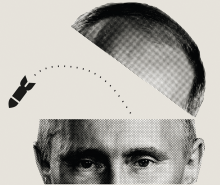
FOR MORE THAN two centuries, the United States has been the proudest example of democracy in the world. Maybe not the best, but definitely the proudest. Oh sure, we’ve hit some rough patches over the decades, mainly in dealing with our native peoples and other ethnic minorities. Also with women, the poor, the falsely accused, the unemployed, and people who aren’t bankers. But let’s just call those growing pains.
For the most part, America has been that shining city on a hill, and by America, of course, I don’t mean Canada or Mexico, or the other countries whose names I forget, most of which don’t have many good hills to shine from anyway.
But I’m not talking about geography, I’m talking about pride. The pride that comes from being number one in democracy, despite being number 55th in infant mortality and 35th in math. Okay, so we don’t test well. But we’re proud anyway. And we’re still number one in Bible science! [High five!]
But lately, because of continued dysfunction on Capitol Hill, people are starting to whisper that democracy in the United States may have lost some of its shine, like we’re “hiding it under a bushel,” as it says in the old Christian campfire song of my youth. (We also sang “With Jesus in My Boat I Can Ride Out the Current Economic Downturn,” and “Children, Go Where I Text Thee.”)
But if America’s “little light” is no longer shining, at least a few other nations are providing good examples of self-government.
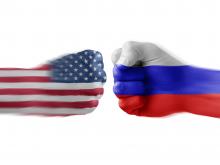
The news coverage of international conflicts can be very disappointing from a mimetic perspective. When conflicts escalate into violence as in Syria or the Ukraine, news outlets rush to cover the hostilities. They give us the facts on the ground, or rumors thereof, accompanied by an almost mindless report of what each side is saying by way of self-justification. However, if you listen to their rhetoric with mimetically tuned ears, which happens after spending time here at Raven, you realize that their rhetoric is all sound and fury signifying nothing. Unfortunately, it is this “nothing” that usually makes the headlines.
Major outlets like the New York Times rarely give as good an analysis as my colleague Adam Ericksen did last week. Speaking of the crisis in Ukraine, Adam said that we often think conflict is the result of differences. But the truth is that rivals resemble each other in often surprising ways. They are in conflict because they share the same desires and so are locked in a competition for something that they cannot or will not share. In the case of the conflict over Crimea, the “thing” is not the region but power and prestige. Adam explains:
Russia’s desire for power is mimetic, or imitative, and modeled on its rival for power, the United States. Russia wants what the United States has — the prestige of being a global super power — and Russia is willing to use the same methods that the United States has used to gain and sustain that prestige — violence.
I’VE RECENTLY spent time researching the vision of the U.S. through the lens of one film for every state, following the intuition that, as most movies are set in Southern California or New York (and there’s a lot more America where those didn’t come from), we need to examine Fight Club and On the Waterfront, Brokeback Mountain and Nashville no less than The Wizard of Oz and Gone with the Wind to begin to capture the American dream life. It seems obvious, but it’s often dismissed: Contrasts between the states are mighty and rich. A Wyoming plain and a Sonoma vineyard, Hoboken and Harlem and Hot Springs, the Florida Keys and the Swannanoa Valley are all magnificent intersections of dreams and mistakes, which in honest art allows them to be places where the past can be faced.
And on that note, here’s my list of the 10 best U.S. films released in 2013:
The new Criterion Blu-ray John Cassavetes box set includes The Killing of a Chinese Bookie, the best entry to his work: A grimy thriller about one man trying to make art against the odds.
Jeff Bridges and Rosie Perez show us something more of how to be human in Fearless (newly available on Blu-ray), about a man who needs to die before he can live (and love).

In a secularized society obsessed with consumerism, entertainment, and modernization, Christianity is often portrayed as being old-fashioned, irrelevant, and useless, but it still serves some very valuable and profound purposes. Here’s why Americans still need it:
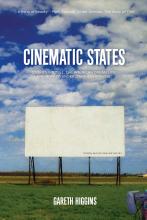
Lots of people like movies; Gareth Higgins loves movies. But the founding director of the Wild Goose Festival and long-time peace activist engages popular culture with a different eye than most of us. And he’s used that keen eye for deeper meaning to create his latest book.
I asked Gareth about his new book on American film, his peace work, and what it’s like considering American culture both as an insider and as a non-native. Here’s what he had to say.
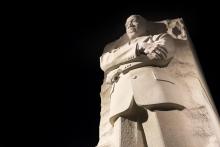
I must use the adverb “almost” because there is a necessary distinction between all and some. It is the difference between mighty and almighty.
But we must never forget that whatever is mighty can harness the power to destroy lives, families, communities, institutions, and nations. This is what racism does on a daily basis.
We have, to some degree, lost the will and/or the capacity to identify and challenge this destructive and powerful force in our culture and institutions.
This Advent season presents the church with a great moment — an opportunity — to sharpen its discernment. It is an opportunity for the church and the world to experience a new birth in love, racial justice, and reconciliation.
American Promise spans 13 years as Joe Brewster and Michèle Stephenson, middle-class African-American parents in Brooklyn, N.Y., turn their cameras on their son, Idris, and his best friend, Seun, who make their way through one of the most prestigious private schools in the country. Chronicling the boys’ divergent paths from kindergarten through high school graduation at Manhattan’s Dalton School, the documentary presents complicated truths about America’s struggle to come of age on issues of race, class, and opportunity. American Promise is an Official Selection of the 2013 Sundance Film Festival.
The Criminal Justice Degree Hub released an infographic on mass incarceration in the U.S. titled "Locked Up In America." According to the extensive graphic, the U.S. has 5 percent of the world's population and 25 percent of the world's prisoners.
Check out the graphic here.
As the Creation Care campaign associate at Sojourners, my job is to get people thinking about God’s call for us to care about the creation. Usually, I do that from behind a desk in Washington, D.C., but recently I got to do it from a boat out on the bayou in Louisiana, in a tiny community that has been hit by eight disasters in eight years (seven hurricanes and the Deepwater Horizon oil spill). I took 100 people out to the town of Jean Lafitte, less than an hour from New Orleans, to hear from people who live on the front lines of climate change.
One of the obstacles to igniting a passion about climate change is that it feels so abstract; it feels like a future problem, a global problem. But it’s really a here and now problem. We took folks out on the Louisiana bayou to meet with those who are living in the midst of climate change – people who don’t think of themselves as environmentalists, but who can bear witness to the impact that climate change and our use of dirty energy have had on their lives, personally.
The town of Jean Lafitte is an old and diverse town, a close-knit community where faith is important to many people, including the mayor. It’s a town that sounds a lot like the early Christian church. We were told that homelessness is not a problem there – if your neighbor loses her home, why wouldn’t you take her in? We were told that when the state government showed up two weeks after Hurricane Katrina, the town had recovered so quickly that the government thought the hurricane hadn’t hit them. This community comes together, and because it knows how to survive, it often gets forgotten by government responders and by oil companies like BP.
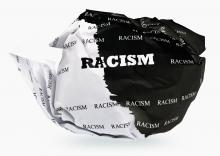
IN SPIRITUAL AND BIBLICAL terms, racism is a perverse sin that cuts to the core of the gospel message. Put simply, racism negates the reason for which Christ died—the reconciling work of the cross. It denies the purpose of the church: to bring together, in Christ, those who have been divided from one another, particularly in the early church's case, Jew and Gentile—a division based on race.
There is only one remedy for such a sin and that is repentance, which, if genuine, will always bear fruit in concrete forms of conversion, changed behavior, and reparation. While the United States may have changed in regard to some of its racial attitudes and allowed some of its black citizens into the middle class, white America has yet to recognize the extent of its racism—that we are and have always been a racist society-—much less to repent of its racial sins.
President Obama addressed the nation today regarding the George Zimmerman trial, giving his thoughts on the nation's response to the verdict and the state of racism in our society.
Folks understand the challenges that exist for African-American boys, but they get frustrated, I think, if they feel that there’s no context for it or — and that context is being denied. And — and that all contributes, I think, to a sense that if a white male teen was involved in the same kind of scenario, that, from top to bottom, both the outcome and the aftermath might have been different.
You can read the full transcript of his speech here.

The recent “not guilty” verdict out of Sanford, FL, reflects the principle of the American legal system that if there is reasonable doubt, courts will err on the side of innocence. I dispute neither the principle nor the decision by the jury. But that doesn't leave me satisfied about the outcome.
Jesus said that true justice exceeds that of “the scribes and Pharisees” — and the same could be said of the prosecution and defense. Legal justice seeks only to assign guilt or innocence. Holistic justice works for the life, liberty, and well-being of all. And it especially works for reconciliation between the two Americas that can be identified by their reaction to the case.
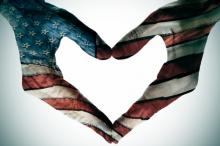
I was five years old on Independence Day in 1976. The United States' bicentennial fever had overtaken the entire population. Everything was dressed in red, white, and blue. I remember decorating my tricycle in streamers and balloons for the neighborhood parade. It rained through the entire event, and although I crossed the finish line covered in red and blue dye, my award for "most colorful float" made it all worth it.
Also attended Willie Nelson's Fourth of July birthday party/concert that same year. We camped out under the stars and enjoyed music for days in a Woodstock-like environment. I remember seeing my first naked adult woman there. She and her family – or some group of friends – were taking a break to bathe in the nearby river. Hey, it was the 70s, remember?
But even there in that hotbed of post-hippie activity, everyone displayed affection for our country. Even those who likely had stood in protest against the Vietnam War only years before rose and placed their hands over their hearts when the national anthem was sung and the flag was unfurled every morning.
Somewhere along the way, the idea seeped into our national consciousness that patriotism and political criticism could no longer coexist. Those who questioned or challenged the agendas or motives of those in power were pegged as patently unpatriotic; in turn, those dissident voices increasingly rejected the commonly embraced symbols of patriotism as mere tokens of jingoist American exceptionalism.

Tomorrow, millions of people across this land, will be celebrating our nation’s freedom. Many will be marking Independence Day by going to see the fireworks, watching Fourth of July parades, or just having a barbecue and enjoying time together with their family or friends.
One of the things I began doing a few years ago on the Fourth of July was to call a very special person in my life and in the life of my family. His name is Paul Anderson. Had it not been for Paul and his family, my family and I would not have been able to emigrate in 1987 from Poland to the United States. So on every July 4, I call Paul and thank him for helping me and my family arrive safely and settle in this country.
I tell him that he’s had an important part to play in so many good things I’ve experienced over the past 26 years that I’ve been living here — including discerning a Franciscan vocation and becoming a friar.
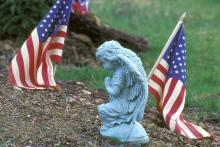
It’s here, God — Election Day in America. Today is the day when Americans everywhere are given the privilege and responsibility to exercise dominion (agency) at the polls.
Scripture tells us every human being is made in the image of God. We are, therefore, equally worthy of protection of the law. The United States Constitution and its Amendments tell us we are equally worthy of life, liberty, and the pursuit of happiness. Yet, at this very moment, laws stand poised to snatch dominion from the hands of the poor, the weak, and the vulnerable, ethnic minorities, students, and the elderly. Some scurrilous elected officials have worked behind the scenes to suppress the ability of voters to elect the person of their choice — all for the sake of politics

The difference between sex trafficking and freelance prostitution is who has the control and who is keeping the money, said prosecutor Lindsey Roberson, an assistant district attorney in New Hanover County. If a girl or a woman is being forced or coerced by a pimp to perform sex acts without monetary gain, that’s trafficking.
The North Carolina Coalition to Combat Human Trafficking ranks the state among the top 10 states for the problem. North Carolina’s three major highways connect much of the East Coast, and the state has a large transient military and farmworker population, and international seaports in the Cape Fear region.
In May, Roberson helped start a deferred prosecution pilot program for first-time offenders with prostitution charges, partnering with a local rape crisis center.
As a Christian, Roberson is also on the board of a new faith-based effort called the Centre of Redemption, which is scheduled to open in December to help pregnant teens and teen moms who are also trafficking victims.
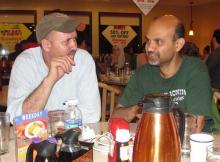
Muslim immigrants to America frequently worry whether their children will be able to maintain their Islamic identity in a country with a reputation for rampant vice and promiscuity. Many respond by limiting their children’s social contacts to school, family, and mosque.
But that approach can backfire, some Muslim family experts say. While they advise parents to help their children make Muslim friends, they also say Muslim kids can — and should — fully participate in American culture without compromising their Islamic values.
It’s a formula that’s worked for generations.
Farhat Husain was 23 when she left Pakistan in 1964 for England, where her husband received his Ph.D. at Oxford. Her daughter was born there in 1967, before the family moved to New Haven, Conn., in 1969, then to the Boston area in 1971. Her son was born there in 1976.
Both she and her husband were practicing Muslims and well-educated, and wanted the same for their children. She became involved in the international clubs at the universities where her husband worked — cooking for potlucks, manning information booths and presenting about Islam at churches, community centers, and her children’s schools.
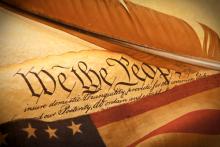
We’ve all heard the rhetoric. “We need to take America back for God!”
Why? Supposedly so we can regain some bygone level of ethics or moral standards. Supposedly, if we don’t, God will get tired of us “rebuking” God and remove God’s hand of protection from us. Supposedly, so God won’t test us or judge us or something.
Yet, as Gregory A. Boyd notes in his important book The Myth of a Christian Nation: How the Quest for Political Power Is Destroying the Church, taking America BACK for God assumes we were at one really belonged to God, followed God, listened to God. Boyd goes on to ask, when was this glorious age in the history of the USA?
Let’s start way back. We’ve been taught that many people migrated to North America for religious freedom. So was this glorious time when some of our forebears imprisoned, tormented, and/or hanged many suspected to be witches? Is that what so many want to take us back to?

It’s a hot summer evening in a Midwestern town. The grass is glimmering in the bright lights, contrasting with the brown dirt of the base cut-outs and pitcher’s mound. On the field, nine to a side, young men are dreaming of making The Show, although one suspects that in their hearts they know most of them won’t. There are no big city teams flush with cash, no mega-millionaire superstars.
The park is half-filled with fans, many of them families out for an evening together. It’s a diverse slice of America; white, African American, Latino, a few Asian. Young boys, and a few girls, sitting in the stands with their gloves on, awaiting a hoped-for foul ball souvenir. Dinner is bratwurst or a chili cheese dog, followed by peanuts or popcorn.